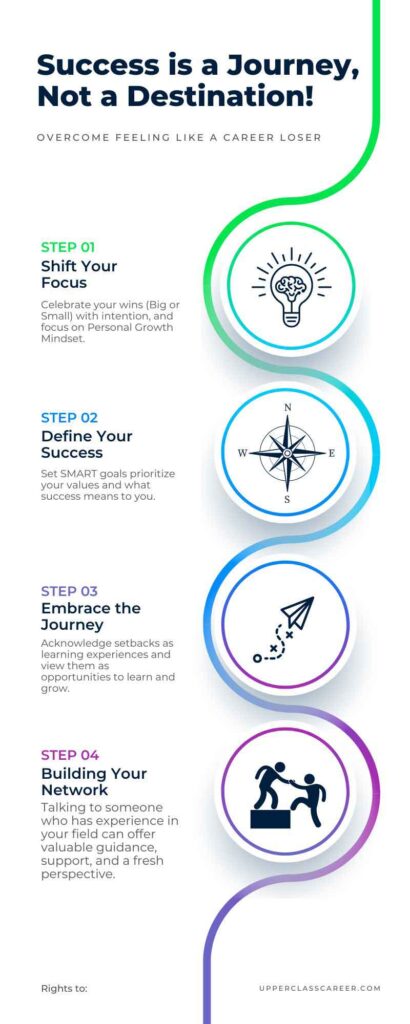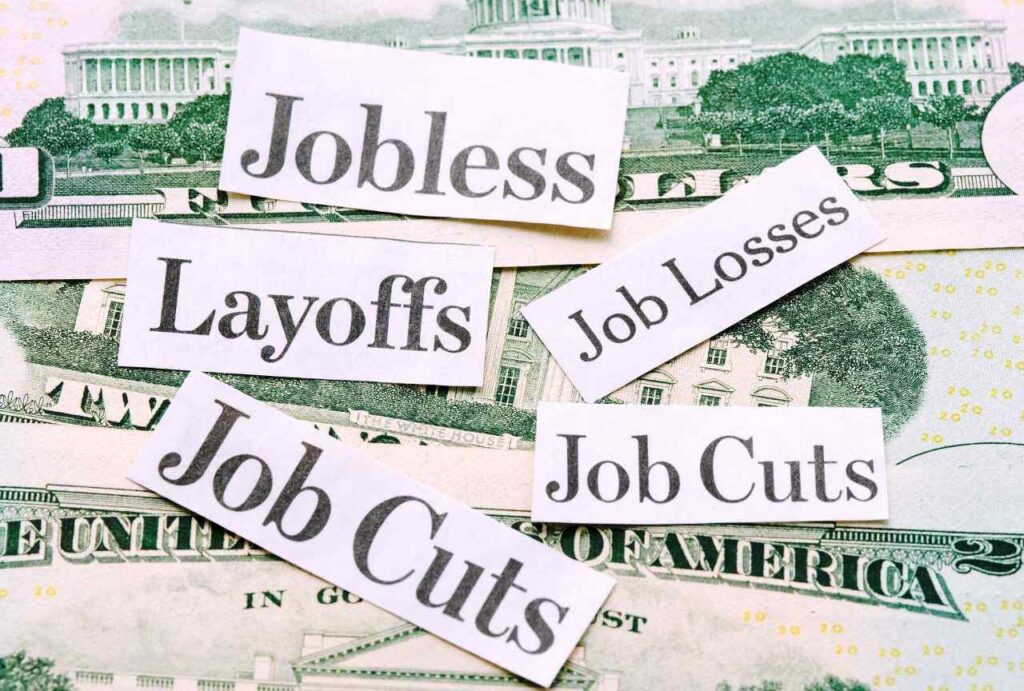Scroll through social media and you’re bombarded with images of colleagues getting promoted, friends launching dream businesses, and former classmates winning industry awards. It’s enough to make anyone feel like they’re stuck in the slow lane of life, wondering, “Am I the only one not achieving anything?”
The truth is, you’re far from alone. Feeling like a career loser – inadequate, unaccomplished, and lagging behind – is a surprisingly common experience. But before you resign yourself to a life of mediocrity, take a deep breath. This feeling, while unpleasant, isn’t a reflection of your reality. It’s a psychological hurdle that can be overcome with the right tools and strategies.
The Psychology of Feeling Like a Career Loser
The sting of feeling like a career loser isn’t just a matter of bruised ego; it’s rooted in some core psychological principles. Here’s a breakdown of why you might be experiencing this and how it can be misleading:
- Social Comparison Trap: Our brains are wired for social comparison. We naturally evaluate ourselves against others, often focusing on those who seem more successful. Social media amplifies this by showcasing curated highlights, creating an unrealistic picture of everyone else’s achievements. This constant comparison fuels feelings of inadequacy and fuels the “loser” narrative.
- Confirmation Bias: When we feel like losers, our brains become adept at finding evidence to confirm this belief. We downplay our accomplishments, discount our skills, and magnify perceived failures. This confirmation bias reinforces the negative self-perception. For instance, you might overlook a successful project because it “wasn’t that big of a deal,” while dwelling on a single missed opportunity. This selective filtering process keeps you trapped in the “loser” mindset.
- The Highlight Reel vs. Reality: Social media platforms are not windows into people’s unfiltered lives. They’re carefully crafted presentations showcasing successes, achievements, and picture-perfect moments. The countless hours of hard work, the setbacks, the failures – these rarely make the cut. We compare our entire, unvarnished journey to someone else’s meticulously curated highlight reel. This disparity creates a distorted reality where everyone else seems to be effortlessly achieving their goals, while we struggle to keep up.
Understanding these factors is the first step to overcoming them. Now, let’s explore why these feelings might not reflect your true potential.

Also Read: How Do You Compete In Today’s Job Market – Strategies To Outshine
Why You Haven’t Accomplished What You Think You Should Have
Feeling like a career loser often stems from a gap between your perception of your progress and what you believe you “should” have achieved. Let’s unpack the reasons why this gap might exist, and offer reassurance that it doesn’t necessarily reflect a lack of ability:
A. Unrealistic Expectations:
Societal pressure and our own ambition can set us up for disappointment. External factors like constant media portrayals of overnight success and the glorification of hustle culture create unrealistic expectations. Internally, we might set overly ambitious goals without considering the time, resources, and learning curve involved. These unrealistic benchmarks make it difficult to feel a sense of accomplishment, even with steady progress.
B. Lack of Clarity:
Without clearly defined goals, it’s hard to measure progress. We might be working hard, but if our efforts are scattered or not aligned with our ultimate objectives, it can feel like we’re spinning our wheels. This lack of clarity breeds frustration and a sense of stagnation, contributing to the feeling of not achieving enough.
C. Fear of Failure:
This fear can lead to procrastination, self-doubt, and a reluctance to take risks. These anxieties can prevent us from putting ourselves out there, taking on new challenges, and ultimately achieving our full potential. The fear of failure might keep you safe, but it also keeps you stuck, hindering the very achievements you crave.
D. Focus on Destination, Not Journey:
Our culture often emphasizes the end goal – the promotion, the raise, the dream job. However, focusing solely on the destination ignores the valuable learning and growth that happens along the way. Every skill you acquire, every challenge you overcome, every project you complete – these are all steppingstones on your career path. Recognizing and celebrating these milestones can counter the feeling of falling short.
Understanding these reasons is the first step toward reframing the narrative. It’s not that you haven’t accomplished anything; it’s that you might be measuring yourself against unrealistic benchmarks or overlooking your progress. In the next section, we’ll explore actionable steps to overcome these hurdles and get back on track towards achieving your goals.

Also Read: How Can Short Term Goals Best Lead Towards Accomplishing Long Term Career Goals?
Actionable Steps to Overcome Feeling Like a Loser
Feeling like a career loser can be a disheartening experience, but it doesn’t have to define you. Here are some practical steps you can take to break free from this negativity and chart a path towards greater satisfaction and achievement:
1. Shift Your Focus:
- Celebrate Your Wins (Big or Small): Acknowledge and celebrate your accomplishments, no matter how seemingly insignificant. Did you successfully complete a challenging project? Did you master a new skill? Did you receive positive feedback from a colleague? Recognizing these achievements, big or small, helps build confidence and reinforces that you are making progress.
- Focus on Personal Growth: Instead of comparing yourself to others, track your own progress. Set realistic and measurable goals that align with your long-term career aspirations. Focus on continuous learning and development – every new skill, every challenge overcome, brings you closer to your goals.
2. Define Your Success:
- Set SMART Goals: Unclear goals lead to a lack of direction and a sense of stagnation. Develop Specific, Measurable, Achievable, Relevant, and Time-bound (SMART) goals that provide a clear roadmap for your career development. These goals should be challenging but attainable, keeping you motivated and engaged.
- Prioritize Your Values: What’s truly important to you in a career? Is it financial security, work-life balance, a sense of purpose, or a combination of factors? Identifying your core values helps you define what success looks like for you, ensuring your goals are aligned with your personal aspirations.
3. Embrace the Journey:
- Acknowledge Setbacks: Failure is inevitable on the path to success. Instead of viewing setbacks as proof of inadequacy, see them as learning opportunities. Analyze what went wrong, adjust your approach, and move forward with the valuable knowledge gained.
- Celebrate Milestones: Break down your goals into smaller, achievable milestones. Celebrating each milestone keeps you motivated and reinforces a sense of progress.
4. Seek Support:
- Build Your Network: Connect with mentors, colleagues, or even a career coach. Talking to someone who has experience in your field can offer valuable guidance, support, and a fresh perspective. Surround yourself with positive and encouraging individuals who believe in your potential.
5. Less-Used but Highly Effective Strategies:
- Practice Gratitude: Take time each day to express gratitude for the positive aspects of your career, even the small things. Gratitude can shift your focus from what’s lacking to what you have already achieved, boosting your overall satisfaction and motivation.
- Reframe Negative Self-Talk: We all have that inner critic. When negative self-talk creeps in, challenge those thoughts. Replace them with positive affirmations that reinforce your skills and capabilities.
- Focus on Your Strengths: Identify your natural strengths and talents and find ways to leverage them in your career. Bonus tip: If you’re unsure of your strengths, take a personality or skills assessment test.
- Upskill Continuously: The world of work is constantly evolving. Stay ahead of the curve by continuously learning new skills and staying updated on industry trends. This not only enhances your value but also keeps your career path exciting and engaging.
- Help Others: Helping others can be a powerful way to boost your confidence and sense of purpose. Mentor a junior colleague, volunteer your expertise, or offer pro bono services to a non-profit organization. Focusing on the positive impact you have on others can counter feelings of inadequacy and remind you of your value.
By implementing these comprehensive steps, you can dismantle the feeling of being a loser and build a strong foundation for success. Remember, progress takes time and dedication. Celebrate your wins, embrace setbacks as learning opportunities, and surround yourself with supportive people. With consistent effort and the right approach, you can transform your career journey into a path of fulfillment and achievement.



